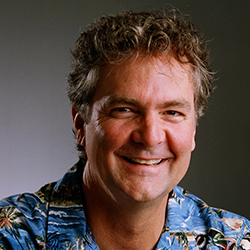Closer to a cure
Obama initiative likely to tap the bioinformatics lab of David Haussler ’75

Haussler, a trailblazer and national leader in gene sequencing, led the team that assembled the first human genome data 15 years ago. He is the scientific director of the University of California, Santa Cruz Genomics Institute.
Scientists there created one of the world’s largest tumor databases. Research based on that data will let doctors tailor cancer treatments to a patient’s genetic makeup — an approach that should be more effective and economical than a “one size fits all” model.
Obama knew all about it, and Haussler was thrilled.
“I want the country that eliminated polio and mapped the human genome to lead a new era of medicine — one that delivers the right treatment at the right time,” the president said in his address. “I'm launching a new Precision Medicine Initiative to bring us closer to curing diseases like cancer and diabetes, and to give all of us access to the personalized information we need to keep ourselves and our families healthier.”
The budget Obama submitted to Congress a few days later included $215 million for the effort. Of that total, $70 million was earmarked for the National Cancer Institute. In 2010, the Institute chose Haussler’s group at UCSC to house the data for its genomic programs.
The budget still has to work its way through Congress, but Haussler is naturally eager to move forward.
“The initiative announced by the president is something that we in the genomics community have been working toward for years,” he says.
Haussler, who grew up in California, transferred to Connecticut College after studying art at the San Francisco Academy of Art and psychology at Immaculate Heart College in Hollywood.
He became interested in science after working in his brother’s laboratory at the University of Arizona the summer after his first year. It wasn’t the experiments that hooked him; it was the data analysis. He came to Conn knowing he wanted to major in math and thought a small liberal arts college would be a good fit for him.
“I wanted a forward-thinking and challenging college,” Haussler says. “I wanted a smaller college where there could be real classroom discussion and interaction. And I wanted a broad liberal arts education rather than any specialized focus. If you want to change the world, you need to understand it and know how to communicate with people.”
He went on to earn a master’s degree in mathematics and a Ph.D. in computer science. But he took his creative energy with him when he moved from art into science.
“I still use that creative mode when I’m building a new field of science,” he says.
Haussler has won several grants to support his work, including $11 million from the National Institutes of Health last fall for a new center that will facilitate the sharing of large amounts of genetic data.
He says the path forward is clear. The biggest policy challenge is overcoming concerns about patient privacy and cost. The biggest technical challenge — Haussler’s area — is the complexity and amount of data.
“It’s a matter of changing the culture in some ways. This can’t happen right away,” he says.
Obama’s plan would accelerate the pace. Haussler is ready.